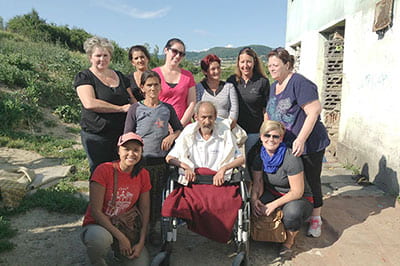 UW-Green Bay Nursing students got the practicum experience of a lifetime this summer, working hands-on with the marginalized Roma people of Slovakia.
UW-Green Bay Nursing students got the practicum experience of a lifetime this summer, working hands-on with the marginalized Roma people of Slovakia.
Traveling with Associate Prof. Janet Reilly, Nursing, and Prof. Sarah Meredith Livingston, Music and Women’s and Gender Studies, the students spent their days caring for and educating the occupants of five Roma settlements scattered throughout the Eastern European country. They worked with residents who had little to no access to health care, dealing with issues ranging from Tuberculosis and sexually transmitted diseases to labor and delivery, tobacco cessation, child development and mental health.
“In all of the camps, the nurses did some health visits,” Reilly said. “People would come outside and they would ask about their blood pressure, their swollen legs, growth and development of their kids, parenting, polio, TB. … I, in my 30 years of nursing, have not seen such young polio patients.”
Eight Nursing students made the trip, along with four Women’s and Gender Studies students — three UW-Green Bay undergrads and an interested community member. The group departed the U.S. June 20 and returned July 3 after an intense two weeks working in five Roma settlements.
Meredith Livingston has led Slovakia travel courses in the past, working closely with Lubomira Slusna, the head of that country’s Association for Culture, Education and Communication (ACEC). Slusna, a tireless advocate for Roma equality, <a href=”“>visited UW-Green Bay in March and was awarded the key to the city of Green Bay by Mayor Jim Schmitt.
Upon the group’s arrival, its members visited the U.S. Embassy in Bratislava and met with representatives of ACEC. Then it was onto the settlements — an experience, Meredith Livingston said, for which the students were not fully prepared.
“It was kind of shocking to everyone, I think,” she said. “I don’t think most people expected that level of (poverty). And the fact that many of them didn’t have water — they had to walk a mile and a half to get water every day.”
Added Reilly: “They’re ostracized, they’re not allowed to be employed, and their conditions are very third-world — no water in some places,” Reilly said. “Just horrific.”
Still, the students began to adjust — and to get to work. In addition to working hands-on to address residents’ health concerns, they did group teaching with health mediators — a group of specially trained Roma citizens whose purpose is to address concerns and help raise the standard of health in each community. The group also visited the Auschwitz concentration camp, where half a million Roma were killed during the Holocaust. And they saw firsthand how discrimination against the group persists today.
“Some of the students would talk to people they met in a restaurant or bar,” Meredith Livingston said, “and they would say ‘what are you doing here?’ and they always said, ‘are you kidding me? Why would you be doing that?’ ”
Still, there were lighter moments during the time in the settlements. Interacting with residents — especially children — proved to be a highlight of the group’s time abroad.
“A lot of the kids had never seen their photograph before, or seen their reflection,” Reilly said. “So they were thrilled for us to take a picture, and wanted to see it. They were very, very excited by that.”
The trip was a positive experience for the students, who were able to make a difference through treatment and health education of the Roma people. Now that the group is back stateside, each student will make a public presentation on the experience, aiming to raise awareness of the poor treatment and conditions of Roma in Slovakia and elsewhere in Europe.
Nursing practicum students will have the opportunity to travel to Brazil during spring break 2015, and Reilly plans to bring practicum students back to Slovakia in two years.









